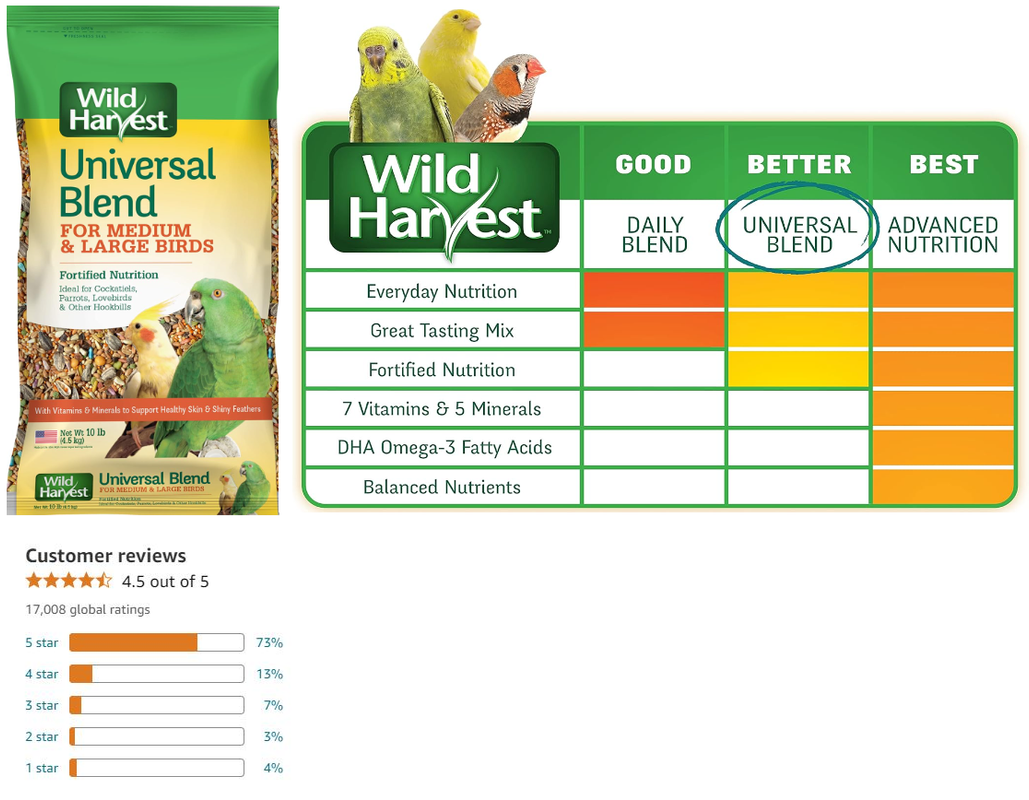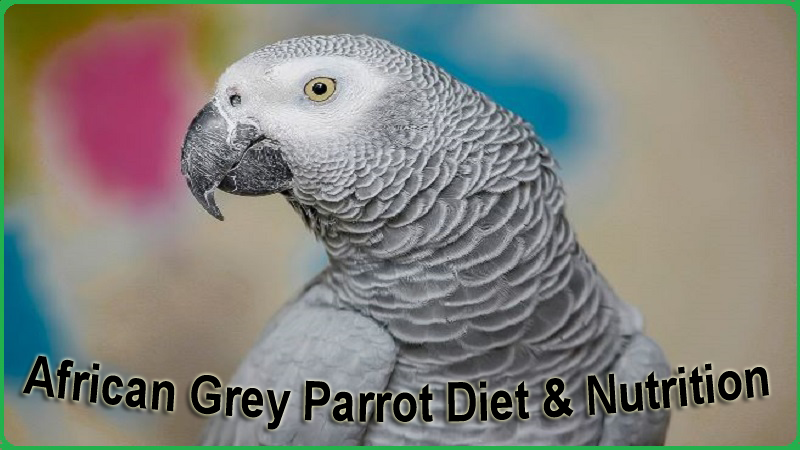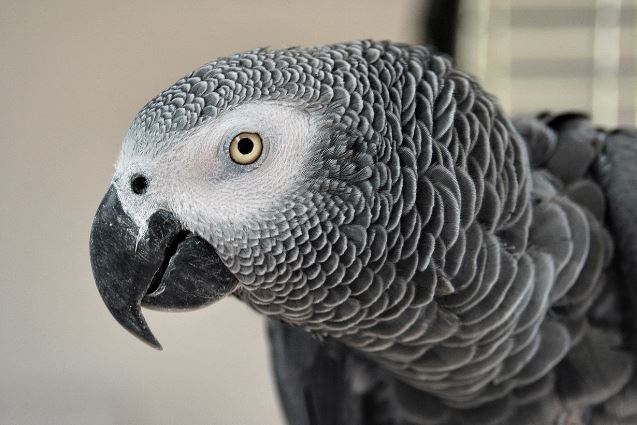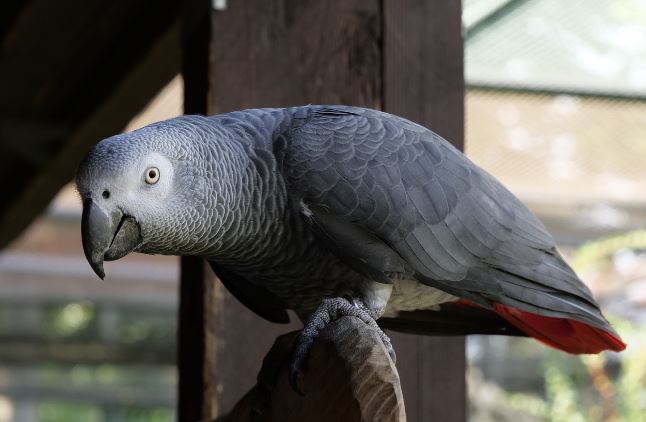As like to other parrots, African gray parrots also need the balanced and varied healthy diet. If, they are unable to get them, then it can pose different health problems, including calcium deficiency. So, in this case, what should be a perfect and well-balanced African Grey Parrot diet?
Have you taken decision to pet African Grey, but don’t know about African Grey Parrots Diet & nutrition habits? As being advisor in our field of vet, here, we will give you full comprehensive guide about how you fulfill your African grey parrots’ diet needs.
As a feeding guide, we have to recommend you a bowl of perfectly chopped all natural & fresh fruits. If, these fruits are not available at any time, then you can prefer a pelleted diet without getting any additives e.g. artificial flavors or colors etc. Don’t stop here! Keep reading it to get complete information regarding African Grey Parrot diet and nutrition in captivity and wild region.
What Are Nutritional Needs of African Grey Parrots?
African Grey Parrots have to need some specific nutritional that helps to improve their healthy life. These parrots need a varied diet that meets their natural preferences and provides essential nutrients.

Diet Diversity: You should feed varied diet to African Grey Parrots. This includes a base of complete or pelleted food (60-80% of daily intake) along with vegetables, sprouting seeds, fruits, nuts, seeds, and other treats
Calcium-Rich Foods: These parrots have to need calcium-rich foods. So, you can allow leafy greens, nuts, and seeds to maintain strong bones and beaks
Selective Eating Habits: They have good understanding for choosing food in the wild. So, they take enjoying a diverse diet like as raw seeds, fruits, greens, and occasional insects.
Lifelong Commitment: With getting proper care and a balanced diet, African Grey Parrots can live up to 50 years.
Avoiding Calcium Deficiency: African Grey Parrots can suffer from calcium deficiency that can pose to seizures, feather plucking, and poor health. So, you should offer the calcium-rich foods like kale, water-grass, cress, almonds, and carrots to prevent this deficiency.
African Grey Parrot Diet in Captivity
You should provide a healthy and balanced diet for African Grey Parrots in captivity. It’s essential to consider their natural preferences and ensure they receive essential nutrients. Here are the key components of an optimal African Grey Parrot diet in captivity:
Also Read: Can Parrots Eat Bananas? Yes or Not
Core Components of African Grey Healthy Diet in Captivity
1) Pellets
Pellets should form the foundation of a captive African Grey Parrot’s diet, comprising 50-70% of their daily intake. These specially formulated pellets provide balanced nutrition that covering essential vitamins, minerals, and proteins.
Benefits of Pellets
- Balanced Nutrition: Ensure a consistent intake of all necessary nutrients.
- Prevents Selective Eating: Parrots cannot pick out only their favorite foods
- Convenience: Easy to store and measure.
Tips
- Choose High-Quality Pellets: Should look for brands with natural ingredients and no artificial colors or preservatives.
- Gradual Introduction: Mix pellets with seeds initially to ease the transition.
2) Fresh Fruits and Vegetables
Fresh produce should make up 20-25% of the parrot’s diet. You should offer several fruits and vegetables that help to receive the beneficial vitamins, minerals, and antioxidants.
Recommended Vegetables
- Root Vegetables: Carrots, sweet potatoes, beets.
- Cruciferous Vegetables: Broccoli, cauliflower, Brussels sprouts.
- Others: Bell peppers, zucchini, peas.
Recommended Fruits
- Apples (remove seeds), berries, bananas, grapes, mangoes, papayas
- Moderation: Citrus fruits like oranges and tangerines.
Benefits
- Dietary Fiber: Supports digestive health.
- Hydration: High water content helps keep parrots hydrated.
Tips
- Thorough Washing: Remove pesticides and contaminants.
- Variety: Always rotate fruits and vegetables to ensure a wide range of nutrients.
- Cut to Size: All pieces should be manageable for the parrot.
3) Seeds and Nuts
You should offer seeds and nuts about 5-10% of the diet, due to their high fat content. They are excellent for foraging activities and as occasional treats.
Recommended Seeds
- Sunflower seeds, pumpkin seeds, flaxseeds, sesame seeds.
Recommended Nuts
- Almonds, walnuts, pecans, hazelnuts (unsalted and unroasted).
Benefits
- Healthy Fats: Support energy levels and skin health.
- Proteins: Essential for muscle maintenance and repair.
- Mental Stimulation: Encourages natural foraging behavior.
Tips
- Moderation: Prevent obesity by limiting seeds and nuts.
- Use as Treats: Ideal for training and enrichment activities.
4) Grains and Legumes
Grains and legumes are essential to add variety and extra nutrients to the diet. They should be cooked and served into small amounts.
Also Read: Can Parrots Eat Grapes with {Seed and Peeps}? Yes or Not
Recommended Grains
- Brown rice, quinoa, oats, barley, whole wheat pasta
Recommended Legumes
- Lentils, chickpeas, black beans, green peas.
Benefits
- Complex Carbohydrates: Provide sustained energy.
- Fiber: Aids in digestion.
- Protein: Supports overall health.
Tips
- Cook Thoroughly: Grains and legumes should be fully cooked and cooled.
- Avoid Additives: Do not add salt, spices, or oils.
5) Protein Sources
You can also provide additional protein, especially during molting or breeding seasons.
Recommended Sources
- Cooked Lean Meats: Chicken, turkey
- Low-Fat Dairy Products: Cottage cheese, yogurt (in moderation).
- Hard-Boiled Eggs
Benefits
- Supports Feather Health: Essential during molting
- Muscle Repair: Necessary for active birds.
Tips
- Small Portions: Offer in moderation.
- Avoid Processed Foods: Stick to natural, unseasoned options.
Supplements and Special Considerations
1) Calcium and Vitamin D3
Calcium is vital for bone health, particularly for egg-laying females. Vitamin D3 aids in calcium absorption.
Sources
- Cuttlebone: Readily available and easy to use.
- Mineral Blocks: Provide additional nutrients.
- Sunlight Exposure: Helps in natural Vitamin D3 synthesis.
Tips
- Ensure Availability: Keep cuttlebone or mineral blocks in the cage.
- Outdoor Time: Supervised outdoor exposure for natural sunlight.
2) Omega Fatty Acids
Omega-3 and Omega-6 fatty acids are crucial for cardiovascular health and feather condition.
Sources
- Flaxseed Oil: You can add it to food.
- Supplements: Specifically designed for birds.
Tips
- Consult a Vet: Before adding any supplements to the diet.
- Use Bird-Specific Products: Ensure safety and efficacy.
Foods to Avoid
Certain foods are toxic or harmful to African Grey Parrots. So, you must be strictly keep away from them.
- Avocado: Contains persin, which is toxic to birds
- Chocolate: Theobromine and caffeine are harmful
- Caffeine: Found in coffee, tea, and some sodas
- Alcohol: Even small amounts can be fatal
- High-Fat, High-Salt, and Sugary Foods: Can lead to obesity and other health issues.
Monitoring and Adjusting the Diet
You should regularly keep monitoring your parrot’s weight, plumage, and overall health. If, you see any sign like as changes in behavior, feather condition, or droppings, then quickly stops them.
Tips
- Weight Checks: Regularly weigh your parrot to monitor for obesity or weight loss
- Behavioral Observation: Observe any changes in activity levels or eating habits
- Veterinary Visits: Ensure annual health check-ups and follow veterinary advice on diet
African Grey Parrot Diet in The Wild
In the wild, african grey are highly intelligent, but these social birds thrive on a diverse diet that fulfill to their nutritional needs. African Grey Parrots have to capable live in different environments, due to their adaptability, so they can exploit a variety of food sources.
Also Read: Can Parrots Eat Strawberries? Should Be Known
Wild African Greys spend a significant time of their day searching for and consuming food that keeps them mentally and physically stimulated. Here, we will show the healthy diet of African Grey Parrots that outlining key components and their nutritional significance.
Key Components of Wild Diet for African Greys
1) Fruits
Fruits are a major part of the African Grey Parrot’s diet in the wild. So, they can have to receive essential vitamins, minerals, and hydration.
Common Fruits in the Wild Diet
- Figs: Rich in fiber, vitamins, and minerals.
- Palm Fruits: High in fat and energy, providing essential nutrients.
- Guava, Mangoes, and Papayas: Offer vitamins A and C, as well as antioxidants.
Nutritional Benefits
- Vitamins and minerals for overall health
- Natural sugars for energy
- Hydration due to high water content
2) Seeds and Nuts
Seeds and nuts are another staple in the wild diet of African Grey Parrots. These foods contain highly fats and proteins. So, they are essential for maintaining energy levels and supporting feather health.
Common Seeds and Nuts
- Oil Palm Nuts: High in fat and calories.
- Acacia Seeds: Source of protein and fiber.
- Baobab Seeds: Rich in nutrients and antioxidants.
Nutritional Benefits
- Healthy fats for energy and skin health.
- Protein for muscle maintenance and growth
- Fiber for digestive health
3) Vegetation
African Greys consume a variety of plant materials, including leaves, flowers, and bark. These components add fiber and additional nutrients to their diet.
Common Plant Materials
- Leaves from Various Trees and Shrubs: Provide fiber and micronutrients.
- Flowers: Source of nectar and pollen.
- Bark and Twigs: Help with beak maintenance and provide trace nutrients.
Nutritional Benefits
- Fiber for digestion
- Micronutrients and antioxidants
- Beak exercise and maintenance
4) Insects and Small Invertebrates
These are not primary food source, but they occasionally consume insects and small invertebrates. This content is helpful particularly during the breeding season when need the demand of higher protein.
Common Insects
- Termites: High in protein.
- Caterpillars: Provide essential amino acids.
Nutritional Benefits
- Protein for growth and repair
- Essential amino acids for various bodily functions
Seasonal Variations and Adaptability
The diet of African Grey Parrots varies with the seasons and availability of food sources.
During the wet season, when fruits are abundant, their diet is rich in fresh produce.
In the dry season, they rely more on seeds, nuts, and vegetation.
What Can African Grey Parrots Drink?
African Grey Parrots, like all birds, have specific needs when it comes to hydration. So, here we will cover some essential things about what African Grey Parrots can drink:
Also Read: Can Parrots Eat Carrots? (Yes or Not} Feeding Guide
1) Fresh Water
You should always offer fresh and clean water to drink for African Grey Parrots. It should be available at all times, and changed daily to ensure it remains uncontaminated.
Tips
- Daily Change: Refresh the water at least once a day.
- Clean Bowls: Use a clean, non-toxic bowl and wash it regularly to prevent bacterial growth.
- Monitor Intake: Keep an eye on how much your parrot drinks to monitor for any health issues.
2) Fruit Juices
Occasionally, you can also offer diluted, natural fruit juices as a treat to your African Grey Parrots.
Suitable Juices
- Apple Juice: Dilute with water (1 part juice to 3 parts water).
- Carrot Juice: Freshly pressed and diluted.
- Berry Juices: Blueberry or strawberry juices, well diluted.
Tips
- Dilution: Always dilute juices to reduce sugar content.
- Frequency: Offer only occasionally as a special treats, not daily.
Never Give African Grey Parrots to Drink
There are several liquids that are harmful to African Grey Parrots and should be avoided:
- Alcohol: Toxic and potentially fatal.
- Caffeinated Beverages: Found in coffee, tea, and some sodas, caffeine can cause hyperactivity and cardiac issues.
- Milk and Dairy Products: Parrots cannot digest lactose, which can lead to digestive problems.
- Sugary Drinks: Sodas, sweetened teas, and other sugary drinks can cause obesity and other health issues.
- Artificially Flavored or Colored Drinks: These often contain harmful chemicals and additives.
FAQs (Frequently Asked Questions)
How Often Should I Feed My African Grey Parrot?
You can Feed your African Grey Parrot twice a day that offering fresh food in the morning and evening. They should be access to clean, fresh water at all times. You always keep monitoring their intake and adjust portions as needed based on their appetite and activity level.
How Much Should You Feed an African Grey Parrot?
If you feed a healthy diet to African Grey Parrot, then it consists of 50-70% high-quality pellets, 20-25% fresh fruits and vegetables, 5-10% seeds and nuts, and occasional protein sources and grains. Although, their level depends on their activity, age, and individual needs.
Are Seeds and Nuts Good for African Grey Parrots?
You can include seeds and nuts in their diet of African Grey Parrot, but in moderation, about 5-10% of their diet. They contain the fat content higher. So, you can use them primarily as treats and foraging activities to avoid obesity.
Summing Up
In healthy diet, you should be included a variety of fruits, vegetables, seeds, and nuts. As similar other birds, African grey parrots also have to need access to fresh water. At the final, African grey parrot diet is an essential part to keep your bird healthy and happiness.
Also Read: Can Parrots Eat Tomatoes? Complete Feeding Guide
If, you like this content, then share it along with your friends, family members, pet lovers or relatives over social media platforms like as Facebook, Instagram, Linked In, Twitter, and more.
Do you have any experience, tips, tricks, or query regarding on this? You can drop a comment!
Have a Nice Day!!






